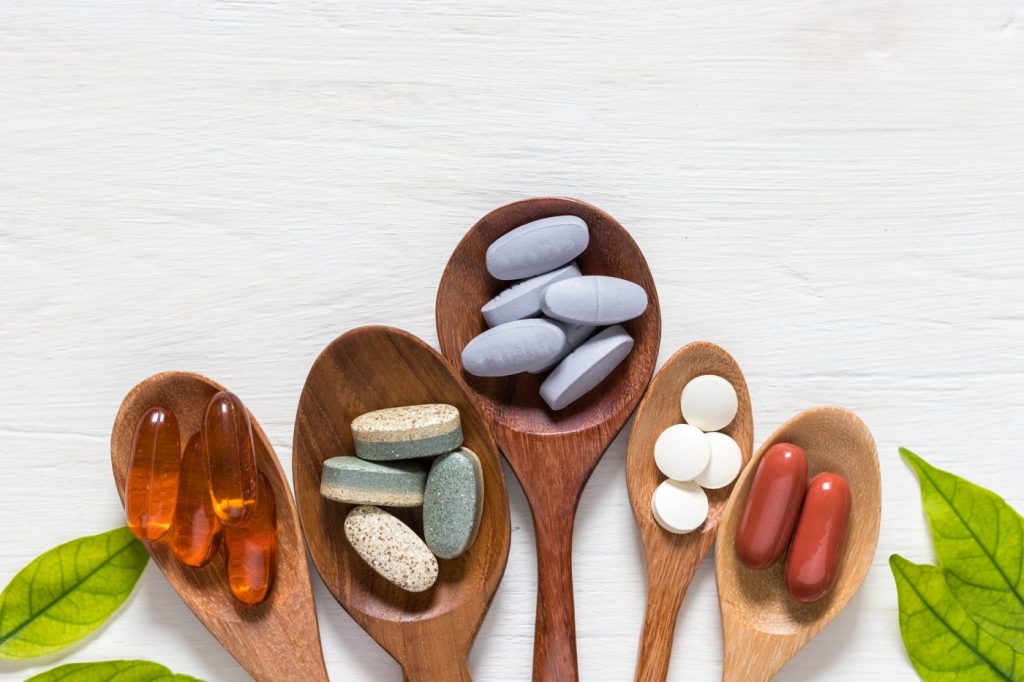Most people take a vitamin every day, whether from a boutique health brand, a jar full of fruity gummies, or a traditional white bottle from a local pharmacy. 86% regularly take vitamins, according to an online survey. According to a similar survey, Ninety-seven percent of women take prenatal vitamins or multivitamins during pregnancy. But who needs these vitamins, and how much do they improve your health?
For decades, vitamins have been marketed as an easy way to make up for a poor diet and get your body’s essential nutrients. But the most recent science says that multivitamins—whether they’re a special formulation for women or not—aren’t as good for your overall health as you might imagine. A scientific review examined five randomized, controlled trials with 47,289 people and found that vitamins had no effect in women on primary prevention of chronic diseases or cancer development. So should you be taking a daily multivitamin for women? The experts say, “probably not.” Here’s why.
Common Ingredients In A Multivitamin For Women

When you pick up a bottle of vitamins that says “specifically formulated for women,” what does that mean? Is it for bone health or for pregnant women?
“Many brands of women’s multivitamin gummies marketed toward women will have high levels of certain nutrients that women are commonly deficient in, such as iron or calcium.”.
But being labeled as “women’s specific” may mean nothing at all. “There is plenty of marketing to suggest that multivitamins for women are distinct from other multivitamins. The reality is that there is no legal or regulatory definition for multivitamins, including those marketed specifically to women.” In other words, women’s vitamins may be no different from other supplements.
Most commonly, women’s vitamins will contain a long list of essential vitamins and minerals, including vitamin A, B vitamins (vitamin B6 and vitamin B12), vitamin C, vitamin E, calcium, iron, magnesium, potassium, thiamin, riboflavin, niacin, folate, and biotin. However, vitamins and supplements are not regulated by the Food and Drug Administration (FDA). They are not subject to their standards or laws, so ingredient lists and amounts can widely vary. And the efficacy of the ingredients is not promising.
Do Vitamins For Women Work?
Any scientist or researcher would be hard-pressed to suggest a daily multivitamin—for the following reasons.
There’s no strong evidence of benefits.
Even as early as 2006, the National Institute of Health said there wasn’t enough evidence to recommend taking multivitamins. Additionally, an editorial that accompanied a 2013 study published in the Annals of Internal Medicine was straightforward with the title: “Enough Is Enough: Stop Wasting Money on Vitamin and Mineral Supplements.”
Many experts are taking a definitive stance on supplements, stating that most people should stop spending their money on multivitamins after studying prove their benefits to be small or nonexistent—especially for postmenopausal women. A Women’s Health Initiative study found that postmenopausal women who took multivitamins did not have a lower death rate than others and were just as likely to develop cardiovascular disease or cancers of the lung, colon, rectum, breast, and endometrium—these results that are consistent with findings from other a plethora of other studies.
To satisfy your body’s nutritional needs with food, try incorporating this list into your diet:
- Avocados
- Leafy vegetables like chard, collard greens, kale, mustard greens, spinach
- Bell peppers
- Brussels sprouts
- Mushrooms (crimini and shiitake)
- Baked potatoes
- Sweet potatoes
- Cantaloupe, papaya, raspberries, strawberries
- Dairy products, such as low-fat yogurt
- Eggs
- Seeds (flax, pumpkin, sesame, and sunflower)
- Dried beans (garbanzo, kidney, navy, pinto)
- Lentils, peas
- Almonds, cashews, peanuts
- Whole grains such as barley, oats, quinoa, brown rice
- Salmon, halibut, cod, scallops, shrimp, tuna, sardines
- Lean beef, lamb, venison
- Chicken, turkey
However, there are exceptions to the rules—as is the case with pregnant or lactating women and populations at risk for a vitamin or mineral deficiency. In these special circumstances, dietary supplements are routinely recommended.
What Supplements Should Women Take?

The following are recommended vitamins for women:
Folic acid/folate (vitamin B9)
“Folic acid is a good idea for people planning on becoming pregnant.” “Having sufficient intake of this nutrient can help prevent neural tube defects in babies.” The Centers for Disease Control and Prevention recommends that women of reproductive age get 400 micrograms (mcg) of folic acid daily to prevent congenital disabilities. However, according to the Office on Women’s Health, the recommended amount rises to 4,000 mcg if you become pregnant or have a family history of spina bifida.
There are some exceptions: “people who have a genetic variation—called MTFHR—might have trouble converting folic acid into a form of folate that their body can use.” These patients should discuss with their physician the type and amount of folic acid that is best for their situation. Folic acid can also interact with necessary medications for epilepsy, diabetes, lupus, and rheumatoid arthritis.
Vitamin B-12
Vitamin B12 is a nutrient that helps keep the body’s nerves and blood cells healthy. The National Institutes of Health recommends that adult women get 2.4 mcg of B12 daily. That amount rises to 2.6 mcg during pregnancy and 2.8 mcg while breastfeeding.
Those deficient in it are often incredibly tired and weak—and there are plenty of reasons why someone could be deficient. Older people might not be able to absorb as much B12 from food, while vegans or vegetarians may have trouble getting enough because B12 is found naturally in animal products.
Certain health conditions can also impact vitamin absorption. “People who have digestive diseases like Celiac disease or Crohn’s disease may have trouble absorbing enough B12 from food. The same goes for people who have had GI surgeries, including weight loss surgery. There’s also a condition called pernicious anaemia in which a person doesn’t make intrinsic factors—so they can’t absorb B12. These conditions and circumstances would warrant a person having some B12 supplement.”
Vitamin D
The National Institutes of Health recommends that adults get 15 mcg (600 IU) of vitamin D daily. After age 70, that amount increases to 20 mcg (800 IU), which can be difficult if you wear sunscreen (you should!), spend most of your time indoors or have a vitamin D deficiency. In those cases, a supplement can be helpful.
Calcium
Some doctors may suggest women take calcium supplements, which can be essential in preserving strong bones—especially in postmenopausal women. According to the Office of Women’s Health, the recommended amount varies by age from 1,000 mg to 1,300 mg.
Studies suggest that most women do not get the recommended daily value of calcium daily from their diet, which could lead to osteoporosis or other health problems.
Iron
Iron is recommended when your red blood cell count is low or at risk of becoming low—for example, if you are anaemic. But there are other cases in which supplemental iron is needed for women. According to the office of Women’s Health, the amount you need throughout your life is:
Ages 19 to 50: 18 mg
During pregnancy: 27 mg
Ages 51 and older: 8 mg
“In addition to women with or who are prone to anaemia, iron will often be prescribed to pregnant women.” “During pregnancy, blood volume increases and iron needs increase—so supplemental iron is often recommended.” Just be sure to talk to your healthcare provider before taking a supplement. It’s important to determine what’s causing low red blood cell counts before treating.
Talk To Your Healthcare Provider

You need the vitamins—and dosages based on your age and health conditions, such as pregnancy. “Some [daily reference intake] recommendations do not vary dramatically; for example, vitamin D needs for women remain fairly constant from childhood through adulthood, regardless of pregnancy or lactation.” “Others change quite a bit throughout the lifespan, such as iron needs that more than double during a woman’s childbearing years and more than triple during pregnancy.”
In other words, there’s no one-size-fits-all solution for getting the nutrients you need for optimal health. If you are concerned about a vitamin deficiency, consult your physician about what appropriate supplementation could look like. It’s different for everyone, so one tablet probably can’t solve all of our needs.




